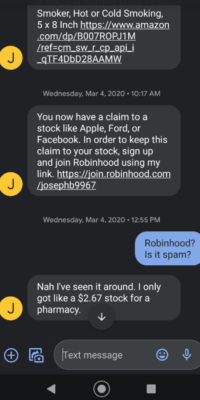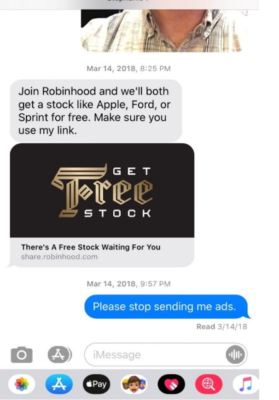Robinhood faces amended complaint over spam messages
Online trading app Robinhood is facing an amended complaint regarding its “refer-a-friend” marketing campaign. About six months after the filing of the initial complaint against the company at the California Northern District Court, Robinhood is now facing a revised complaint over the spammy messages.
The lawsuit, closely watched by FX News Group, has been transferred to the Washington Western District Court. The first Class Action Complaint has been amended by adding an additional Plaintiff, adding more details about the facts out of which Plaintiffs’ claims arise, amending the class definition, and removing the allegation that Robinhood “initiated” the text messages at issue in this case.
 Let’s recall that the case focuses on messages that Robinhood clients send to their friends as part of Robinhood’s refer-a-friend campaign. The plaintiffs in this lawsuit are displeased with the fact that they never consented to receive such messages.
Let’s recall that the case focuses on messages that Robinhood clients send to their friends as part of Robinhood’s refer-a-friend campaign. The plaintiffs in this lawsuit are displeased with the fact that they never consented to receive such messages.
Defendant pays its users to recruit additional Robinhood users in order to drive revenues. The exact form of payment offered to Robinhood users for successful referrals has varied since the start of the program. For example, Robinhood has remunerated users with $5, one share of stock, three shares of stock, or even five shares of stock for each successful referral.
Users are encouraged to send referrals to as many people as possible in order to improve the odds that someone they refer actually signs up, resulting in payment for the referrer, and can earn up to $500 worth of stock in one year.
The Robinhood App, which is designed and maintained from Defendant’s headquarters in Menlo Park, assists in the transmission of illegal text messages using two primary methods.
Specifically, when a Robinhood user clicks on either “Rewards” or “Earn Rewards” in the Robinhood App, the user is then prompted to either “Invite Contacts” or “Share Link.”
Clicking on either option prompts the user to select individuals from the contacts stored on the user’s phone to whom to send Robinhood commercial marketing text messages. Once the contacts to whom the message will be sent are selected, the user’s native text messaging application opens with a pre-composed text message directed to the selected recipient(s) containing Robinhood marketing content.
The pre-addressed text message includes an invitation to join Robinhood, a promise of free stock, and a unique referral link that allows Robinhood to identify the sender of the message. All the user has to do is hit send and the message that Defendant composed is sent to the selected contacts.
The plaintiffs argue that Robinhood substantially assists and supports its users in sending illegal text messages by, inter alia:
- a) encouraging and incentivizing its users to send referral messages by compensating them with free stock;
- b) technologically enabling its users to initiate referral text messages through the Robinhood App;
- c) suggesting which contacts should receive referral text messages when the user uses the “Share Contacts” method;
- d) composing the text messages;
- e) composing and providing unique user-specific referral links that a text recipient can use to sign up for Defendant’s services; and
- f) formulating text and images to be sent as part of the refer-a-friend text messages.
The plaintiffs note that Robinhood does not obtain recipients’ clear and affirmative consent in advance to receive the referral text messages and consciously avoids knowing whether its users send the commercial marketing text messages without obtaining recipients’ clear and affirmative consent in advance to receive the referral text messages.
Plaintiffs bring this case as a class action on behalf of a Class defined as:
All persons:
- 1) to whose telephone number Defendant assisted in the transmission of one or more commercial electronic text messages as part of its referral program from August 9, 2017 through the date the Court certifies the Class;
- 2) where such message was sent while such person was a Washington resident; and
- 3) while the number to which the message was sent was assigned for cellular phone or pager service that is equipped with short message capability or any similar capability allowing the transmission of text messages.

“Assist the transmission” means “actions taken by a person to provide substantial assistance or support which enables any person to formulate, compose, send, originate, initiate, or transmit a commercial electronic mail message or a commercial electronic text message when the person providing the assistance knows or consciously avoids knowing that the initiator of the commercial electronic mail message or the commercial electronic text message is engaged, or intends to engage, in any practice that violates the consumer protection act.”
Robinhood’s conduct allegedly violated the Washington Consumer Electronic Mail Act (“CEMA”), RCW 19.190.010 et seq., which makes it illegal for a person to “initiate or assist in the transmission of an electronic commercial text message to a telephone number assigned to a Washington resident for cellular telephone or pager service…” RCW 19.190.060.
The plaintiffs seek, inter alia, that the Court grant declaratory, equitable, and/or injunctive relief as permitted by law to ensure that Defendant will not continue to engage in the unlawful conduct described in this Complaint.
Finally, the plaintiffs request that, if the Court permits Robinhood to engage in or rely on spam texting, it enter a judgment requiring them to adopt measures to ensure CEMA compliance, and that the Court retain jurisdiction for a period of at least six months to ensure that Defendant complies with those measures.





